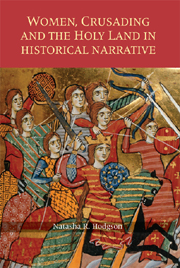Book contents
- Frontmatter
- Contents
- In memoriam Paul Ivison, a fellow enthusiast
- General Editor's Preface
- Acknowledgements
- Abbreviations
- Maps
- Genealogical Tables
- Introduction
- PART I
- 1 Literary Context
- 2 Authorship
- 3 Women in the History of Crusading and the Latin East
- PART II
- Conclusion
- Bibliography
- Index
- Warfare in History
3 - Women in the History of Crusading and the Latin East
from PART I
Published online by Cambridge University Press: 12 September 2012
- Frontmatter
- Contents
- In memoriam Paul Ivison, a fellow enthusiast
- General Editor's Preface
- Acknowledgements
- Abbreviations
- Maps
- Genealogical Tables
- Introduction
- PART I
- 1 Literary Context
- 2 Authorship
- 3 Women in the History of Crusading and the Latin East
- PART II
- Conclusion
- Bibliography
- Index
- Warfare in History
Summary
Women as Audience
HAVING demonstrated that crusade narratives reflected both ecclesiastical and noble values and interests, the next step must be to consider whether the women portrayed in crusade narratives were deliberately intended to provide guidance for a female audience. Would women have had access to such histories through oral transmission, or even have been able to read them? Evidence about literacy amongst women is limited before the late medieval period, but some of the high-profile figures who featured in crusade narratives were associated with education, such as Queen Mathilda of England, Mathilda of Tuscany, Ida of Lorraine, Queen Melisende of Jerusalem, Adela of Blois and Eleanor of Aquitaine. Key indicators of women's literacy were the patronage and ownership of books, but as already established, commissioning literature was not definitive proof of the ability to read and write. Arguments about women's literacy are also governed by the division between traditional Latin literacy and the vernacular literature flourishing at the courts; however, some female aristocrats of the twelfth century were known to be literate in Latin. Queen Mathilda was educated at the convent of Romsey and composed Latin letters to Archbishop Anselm of Canterbury; and both Melisende of Jerusalem and crusader Margaret of Beverley are thought to have owned Latin Psalters. Baudri of Bourgueil composed verse for Adela of Blois which praised her patronage and her skill at composition, but she was interested in the historical past as well.
- Type
- Chapter
- Information
- Publisher: Boydell & BrewerPrint publication year: 2007



